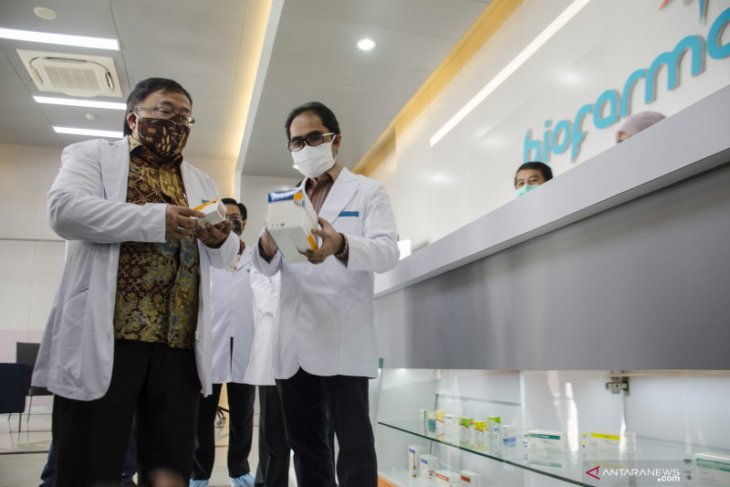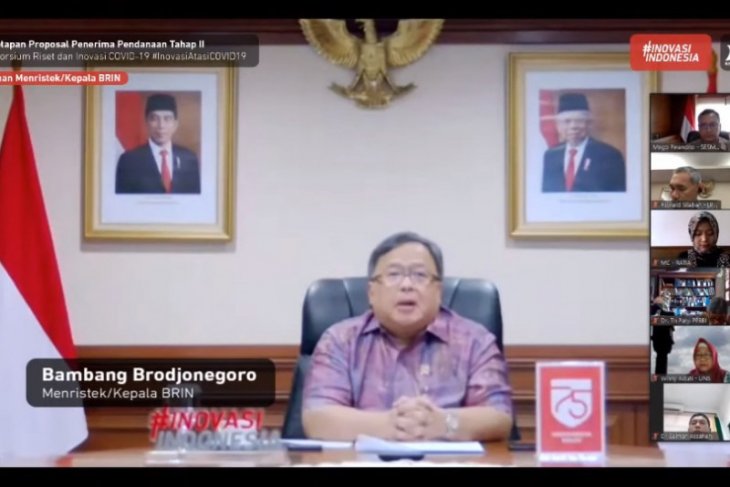Live Streaming
Program Highlight
Company Profile

Ani Hasanah
Vice President Ma'ruf Amin has appealed to Islamic economic and financial actors to hone their digital literacy skills to survive amid the changes arising from the COVID-19 pandemic.
"Adaptation is the key to survival for us all," he remarked at the virtual opening of the 2020 Sharia Economic Festival and Indonesia Sharia Economic Festival (ISEF) in Jakarta, Friday.
Amin affirmed that digitalization was conducted in the wake of the changes in the current life order, including shopping for basic necessities online or through social media with the use of the internet.
The vice president, concurrently the daily chairperson of the National Committee for Sharia Economics and Finance (KNEKS), encouraged sharia economic actors to follow fundamental changes pertaining to the development of digital technology since it is unquestionably necessary in this time and age.
Amin noted that in terms of products, health and hygiene aspects were of absolute importance and offered enormous opportunities for the halal product industry.
The vice president stressed on the need for halal products to be high quality, tasty, healthy, nutritious, and hygienic.
Furthermore, products pertaining to public health and comfort during and after the pandemic also offer new-fangled opportunities.
"Thus, halal products will be the choice of consumers during and after the pandemic," he pointed out.
Not only for sharia economic players, but this year's ISEF was also held virtually to adjust to the current conditions to thwart the transmission of COVID-19.
"This is the first time that digital communication technology is being used. For me, this is a real form of adaptation," he stated.
August

Minister of Research and Technology/Head of the Indonesian National Innovation Research Agency Bambang Brodjonegoro (left) speaks with Bio Farma President Director Honesti Basyir (right) during a working visit to Bio Farma, Bandung, West Java, Wednesday (29/7/2020). ANTARA / Novrian Arbi
Minister of Research and Technology/National Research and Innovation Agency (BRIN) Head Bambang P. S. Brodjonegoro encouraged universities to contribute to development of the national industry through research, development, assessment, and application activities.
"Innovation can be conducted at every stage of R&D (research, development, assessment, and application) to produce superior innovative products. A paradigm shift is necessary from all lines to become an 'innovation-based economy' (an innovation-based country)," Brodjonegoro noted in a written statement received by ANTARA in Jakarta, Friday.
Brodjonegoro remarked that Indonesia envisions becoming a high-income developed nation by 2045 when it celebrates 100 years of independence.
During a virtual seminar themed “Advanced Indonesia Based on National Research and Innovation: The Role of Higher Education in National Industrial Development” organized by Telkom University on August 5, 2020, Brodjonegoro highlighted the need for a breakthrough through innovation to become a developed country.
Minister Brodjonegoro stated that the manufacturing sector remains at the forefront for boosting national economic growth. Hence, for development of the manufacturing industry, a breakthrough is necessary to boost competitiveness based on innovation.
Emphasis on policy programs and policy instruments, such as incentive funds for the Ministry of Research and Technology (Kemristek)/BRIN in the next five years, will lead to the implementation of a "triple helix" of academicians-business-government that in essence is a synergy between universities, ministries and institutions, industry, and government.
The minister noted that research and innovation entails a new mindset, behavior, culture, and way of working. These three can be covered in research-based learning and innovation.
"Triple helix" synergies in COVID-19 prevention comprise involving a consortium of research and innovation, including various non-ministerial research institutions (LPNK), universities, industry, Ministry of Health, Ministry of SMEs, Ministry of Industry, and the private sector synergizing together in the direction of the Ministry of Research and Technology/BRIN.
Thus, in a short span of time, several innovative products can be manufactured, including PCR test kits, rapid tests, autonomous UVC mobile robots, convalescence serum, artificial intelligence systems for COVID-19 detection, immunomodulators, mobile Lab BSL-2, ventilators, and powered air-purifying respirators.
Brodjonegoro affirmed that the present and future changes in several fields during the post-COVID-19 era will change the economic paradigm that will adapt to new habits and regulations in the fields of technology migrating to contactless, human behavior in the context of immune certifications, industrial dynamics, geopolitics, regulations pertaining to new privacy laws, and macroeconomics within the context of limited access to capital.
Furthermore, the minister pointed to 10 technological trends during the COVID-19 pandemic: online shopping and entertainment, digital payments, supply chain 4.0, work-from-home or teleworking, 3D printing, telemedicine, robots and drones, online education and training or tele-education and training, as well as 5G technology and information communication technology, all of which will lead to economic digitization. (ANTARA)
August

Minister of Research and Technology (Menristek)/Head of the National Research and Innovation Agency (BRIN) Bambang P. S. Brodjonegoro. Antara/HO-UI
Research and Technology (Menristek) Minister/National Research and Innovation Agency (BRIN) Head Bambang P. S. Brodjonegoro opined that boosting the public's purchasing power was crucial for maintaining the continuity of micro, small, and medium enterprises (MSMEs).
"Indeed, the government has made several efforts to restore the economy during the current pandemic. Many MSMEs cannot survive during the pandemic. Those able to survive are the MSMEs with exposure to digital economy. Going forward, digital economy is expected to become one of the backbones of the national economy," Minister Bambang P. S. Brodjonegoro noted in a written statement received in Jakarta on Friday.
The Central Statistics Agency (BPS) had announced that Indonesia's economy contracted by 5.32 percent in the second quarter of 2020.
Responding to the condition, Brodjonegoro affirmed that various steps under the framework of the National Economic Recovery (PEN) should be taken promptly, including being heedful of MSMEs as a precautionary measure against recession in the third quarter.
The minister highlighted that based on the results of a study by the Indonesian Institute of Sciences (LIPI) 2020, the sales of MSME products had declined. Based on survey results, a 94.69-percent decline was registered.
"What remains is only 2.65 percent, which also increases 2.65 percent. Most MSMEs have vulnerabilities within the next six months, which will eventually lead to poverty," Brodjonegoro, as the main speaker at the virtual seminar “Indonesian MSMEs” stated on Thursday (July 6).
The minister noted that increasing the purchasing power was the key to economic recovery. The purchasing power or public consumption is the factor that drives the economy.
Hence, the government remains steadfast in its commitment to maintaining domestic purchasing power and demand in the context of restoring the national economy.
"The people's purchasing power will be maintained, through social assistance and subsidies, for the poor and vulnerable," Brodjonegoro remarked. (ANTARA)
The COVID-19 Pandemic Brings about Threats and Opportunities for the Indonesian Aerospace Industry
Jakarta (VOI News) - In the current pandemic situation, the world’s air traffic has decreased by approximately 80 percent. This is different from the situation during the economic crisis and after the 11 September 2001 incident where air traffic only dropped by 20 percent at the most. This was conveyed by Ilham Habibie, Chairman of the Board of Trustees of The Habibie Center, in a virtual seminar, themed "The Journey of the National Aerospace Industry" in Jakarta, Friday (7/8/20). However, Ilham Habibie added, behind these threats, the Indonesian aerospace industry will be able to get through all of this due to the lack of competitors.
"However, I still have the hope that if we someday, in sha Allah, in the not too distant future from now, can go through this, later the structure of the aerospace industry in all sectors will actually be healthier because inevitably there are some competitors who may no longer be able to. compete because they’re out of business. But with fewer competitors and healthy growth, hopefully the industrial structure that we see in Indonesia will also follow this trend and will become healthier," said Ilham Habibie.
A virtual seminar "The Journey of the National Aerospace Industry" was held by The Habibie Center to commemorate 25 years of National Technology Awakening Day. August 10, 1995 was a milestone in the history of technological revival in Indonesia. On that day, the N-250 Gatotkaca aircraft made by the Indonesian people successfully flew for the first time. This aircraft with advanced technology was the mandate of the first President of the Republic of Indonesia, Sukarno, embodied by the third President of the Republic of Indonesia, BJ Habibie. The goal was to connect the Indonesian archipelago. (VOI / Release The Habibie Center / AHM)



